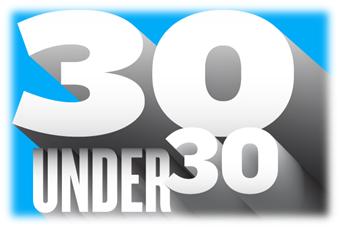One of the nagging broadcast radio problems that no one wants to talk about is the industry’s ability (or inability) to recruit new, young, fresh talent to the programming and performance ranks. Larry Rosin – who wrote a great guest post here last week – has long talked about the need for the infusion of energetic youth in radio.
And if you think back to the ‘70s, ‘80s, and ‘90s, just about all the big PD names at that time were people under 30. Many of the people I came up into the business with back in those days – Dave Hamilton, Tim Sabean, Andy Bloom, Tom Bender, Buzz Knight, Steve Goldstein, and many others – were mostly in their twenties and already programming stations in major markets.
 Today, that is not usually the case. And while perhaps we can think of a handful of truly innovative young programmers (and Edison’s “30 Under 30” promotion showcases this), we are more likely to still see the biggest stations being run by programmers who are already beyond the valued 25-54 demographic.
Today, that is not usually the case. And while perhaps we can think of a handful of truly innovative young programmers (and Edison’s “30 Under 30” promotion showcases this), we are more likely to still see the biggest stations being run by programmers who are already beyond the valued 25-54 demographic.
As others have suggested at conferences, conventions, and in blog posts in this space, radio has a strong need for an infusion of youth – on the air and off. Great talent in both the programming and performance departments will be needed to sustain an industry that absolutely must create proprietary content with a local flavor that is not available on global digital platforms.
This dilemma requires much more than organic solutions. For media wannabes of today, traditional broadcasting jobs are not on most career wish lists. Forward-thinking radio companies will have to participate in outreach strategies in order to attract the talent that will replace today’s aging PDs and on-air announcers.
As we see more and more programmers age out of stations, or watch the retirement of major league hosts (Neal Boortz, Mark Thompson of Mark & Brian fame, and Car Talk brothers Tom and Ray Magliozzi), this issue should be on the agenda lists of CEOs and group programmers in both commercial and public radio.
Which brings me to Apple. It is easy to put them on a pedestal as so many media pundits, bloggers, and writers do. But the fact is, the most successful digital company in the world did not get there by accident. And Apple is competing every day for the best and the brightest, up against Google, Facebook, Amazon, and countless start-ups that promise big payoffs and opportunities to grow.
So when I saw this recruiting video from Apple – a brilliantly constructed propaganda piece – it hit home that keeping up with the Jobses is a challenge that every media company faces.
>EMAIL RECIPIENTS: CLICK HERE TO WATCH APPLE RECRUITER VIDEO<
This short piece of video presents Apple’s values – more than just a mission statement that greets visitors when they visit the corporate offices. Look at how the quotes below exude a values structure that can unite and define a brand:
- “Apple will never give up because it’s too hard or impossible.”
- “There is no such thing as good enough – it just has to be the best.”
- “There’s a belief in the power of small teams to do really great things.”
- “When we go out to do something we don’t start by saying ‘What’s everybody else doing?’ We look to say “What’s the best it can possibly be?’”
Nowhere in this video does it talk about maximizing share price and value to investors. And you heard nothing about distancing Apple from its competitors and growing market share in the tablet and smartphone space. It is implicit that if Apple does its job, those things will come.
This recruiting video brilliance is all about shared values because that speaks the language of today’s youth. Yes, they may all want to become as wealthy as possible, but attracting them to a media brand has as much to do with the philosophy of why companies do the things they do.
Rather than suggesting that your company adopt Apple’s beliefs, the message here is that there’s benefit in creating a company culture that can be communicated to interviewees and incoming talent.
 Apple sets an amazingly high bar, from the development of great products to their brilliant branding to their unique retail experience.
Apple sets an amazingly high bar, from the development of great products to their brilliant branding to their unique retail experience.
This look behind the scenes at the way that Apple first interfaces with prospective employees speaks volumes about the need to actively attract talent by focusing on a company’s values structure that is meaningful and goes beyond “get higher ratings and maximize revenues.”
Those aren’t values. They are goals, and they are far more important to CEOs, COOs, CFOs, and market managers than they are to those seeking a career in media.
If you think about it in radio terms, I would bet that most of us didn’t first decide to go into radio to make a lot of money. We got in to entertain, to make a difference, to connect with audiences, and to inform. We did not get in with the goal of owning a BMW or to live in a mansion. If we turned back the clocks to the values that attracted us to radio in the first place, that same logic would resonate so much better with today’s college graduates.
Thanks to Bill Jacobs for bringing this video to my attention.
- Media And Technology In 2025: Believe It Or Not! - April 18, 2025
- In Radio, You Just Never Know - April 17, 2025
- The Secret To Making A Great Podcast (And Great Radio) - April 16, 2025




Leave a Reply